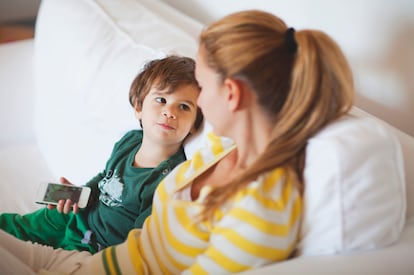Psychologist and Harvard professor Rebecca Rolland: ‘We are turning children into people who act robotically’
Her book ‘The Art of Talking to Children’ is a guide that offers key points for changing daily logistical conversations into chats that encourage creativity and strengthen family bonds.

Momo, the character created by the writer Michael Ende, had a gift: she knew how to listen. People came from all over to the small amphitheater where the little girl loved to talk, at least until the gray men arrived to steal people’s time for chatting. According to American psychologist, author, and Harvard University professor of education Rebecca Rolland, 43, something similar happens today, especially with our children. “We have superficial logistical conversations but spend little time in deeper conversations in which we fully listen,” she explains to EL PAÍS by e-mail.
Rolland, who is also an oral and written language specialist in the department of neurology at Boston Children’s Hospital, recently published The Art of Talking with Children (HarperOne, 2022). In the book, the author argues that if we take advantage of small day-to-day conversations and eliminate time-stealers —the term she uses in her book to refer to the abuse of technology, for example— these conversations serve as great opportunities for learning and developing creativity, and we will also strengthen our bonds with our children in the process.
Question: Why do you believe we need a manual for talking to children?
Answer: We all want the best for our children and, ultimately, for society. We try our best to do that: we take them to activities, we do homework with them, we go to events they organize at school, and so on. But we do not account for the most important key to their development: the conversations we have with them on a daily basis. Often, these conversations are logistical. They are very focused on how we’ll get from one place to another, what our schedules are, and generally how we get through the day to day. There is a lot of research on this that says that if we take these day-to-day conversations and make them great opportunities for learning, for developing creativity in children, as well as for reinforcing bonding, these conversations can be much more effective, and we can improve our lives. I hope this manual can help parents do that.
Q. How disconnected are we from childhood?
A. I think with our busy work lives, we attach a lot of importance to children’s achievements and performance, but we often forget what it’s like to be a child. Sometimes, we are so far removed from a child’s experience, which can be just letting your mind go blank or walking around and looking at what you see. What does give us hope is that we have a great opportunity because children are wonderful to talk to. They have a natural playfulness and sense of wonder, and they see the world from a very different perspective. We have forgotten that because we have learned so much about the world. For example, children often wonder: why don’t we get younger and younger, or what would happen if we lived on Mars? We often forget to ask these important questions, and by spending more time with children and talking to them more, we not only help them, but we also reawaken our capacity for wonder.
Q. It has just been 50 years since the publication of Michael Ende’s book Momo. When you read it, it seems like a premonition of many things that we are experiencing today... Who would you say are the gray men who steal our time today?
A. There are many things that steal children’s time. That’s partly because we fill their schedules with so many things to do. Instead of talking to them, we load them up with experiences and don’t give them time to reflect. We are turning them into people who act robotically, and they are not creative people and do not follow their interests. Another very clear component [of this] is that there are children who are very focused on social media and using the internet. Of course, technology can be put to good use with children, but when they are too focused on searching [the internet] or looking at one perfect picture after another they don’t realize how much time they spend doing that. For example, I know of a case where a child was interacting only through social media. And I think we can’t have them lose those experiences as children and let their lives be focused only on the likes they get.

Q. In your book you emphasize that society wants children to grow up too fast, is this a symptom of how we live?
A. Right now, we certainly live in a culture that is very focused on performance and efficiency, and, with the best of intentions, we often want children to fit into a perfect mold. I think we worry about them falling behind, but we have to [realize] that children’s development takes place over time. Children benefit more from activities that are related to play and discovery, allowing them to discover things for themselves rather than us teaching them a lot of things, especially if they are not ready for it. So, if we put a lot of pressure on them at the beginning, they tend to become anxious because they’re not ready for the things that we’re doing. And they also feel the stress that we feel; we transfer it. It’s important that we reset and respect their natural rhythms.
Q. In your book, you suggest taking time to talk mindfully with them. How does that kind of conversation help children’s development?
A. This is very important. It is a fundamental change in the way children develop and relate to us. We are creating little moments for children that build up over time, and that builds their kindness, their confidence and their creativity. We are inspiring them to think for themselves and recognize that they do indeed have good ideas, that their reflections, their contributions are valuable and that they should continue with them. I think right now we are in a crisis of conversation. Children feel very isolated, sometimes depressed or stressed, and we need those little moments of talking [with them] to be able to break that cycle.
Q. How can we make a difference with our conversations? What are your recommendations?
A. I would start with curious reading. It’s fantastic to do this with children for five or ten minutes, a couple of times a day. No matter how old they are, we sit next to them and watch them. That way we know what they like, what does or doesn’t interest them. Maybe a toddler is playing with pebbles and a teenager is playing video games. It’s about sitting next to them and seeing what’s on their mind. What they like, what fascinates them. And then we ask them questions about this interest.
Q. Do we know how to listen?
A. I think that listening is undoubtedly one of the most significant challenges. Often we don’t listen very well or thoughtfully, and often we don’t teach children to listen well or effectively either. Sometimes, we think we are listening, but really our mind is somewhere else. If we teach children to listen, they will be better able to listen to their peers, to us and to their teachers. This way, we can create a much broader culture of communication.
Q. Is there a technique for getting the attention of someone who is not listening?
A. Yes, I would say yes. First, by using humor. If I think someone is not listening to me, I can say something silly that has nothing to do with the conversation and see how long it takes for them to realize that I said something silly. For example, if you are talking about homework and suddenly you start talking about elephants, you can try to measure how long it takes the child to realize that you are not talking about the same thing. Another idea is to ask someone to repeat what the other person was saying, or what they think the other person was saying, “If you were really listening, tell me what you heard,” and then ask a question. A lot of times we don’t do this. We don’t teach children to ask listening questions. I think teaching children to ask these kinds of questions and modeling it [for them] is a wonderful way to teach them to listen.
Sign up for our weekly newsletter to get more English-language news coverage from EL PAÍS USA Edition
Tu suscripción se está usando en otro dispositivo
¿Quieres añadir otro usuario a tu suscripción?
Si continúas leyendo en este dispositivo, no se podrá leer en el otro.
FlechaTu suscripción se está usando en otro dispositivo y solo puedes acceder a EL PAÍS desde un dispositivo a la vez.
Si quieres compartir tu cuenta, cambia tu suscripción a la modalidad Premium, así podrás añadir otro usuario. Cada uno accederá con su propia cuenta de email, lo que os permitirá personalizar vuestra experiencia en EL PAÍS.
¿Tienes una suscripción de empresa? Accede aquí para contratar más cuentas.
En el caso de no saber quién está usando tu cuenta, te recomendamos cambiar tu contraseña aquí.
Si decides continuar compartiendo tu cuenta, este mensaje se mostrará en tu dispositivo y en el de la otra persona que está usando tu cuenta de forma indefinida, afectando a tu experiencia de lectura. Puedes consultar aquí los términos y condiciones de la suscripción digital.









































